| Article ID | Journal | Published Year | Pages | File Type |
|---|---|---|---|---|
| 4309462 | Surgery | 2008 | 10 Pages |
BackgroundWe have previously shown that angiotensin converting enzyme-inhibitor (ACE-I) improved colonic inflammation and apoptosis in a dextran sodium sulfate (DSS)-induced colitis model. This study attempted to determine whether ACE-I could prevent the development of colonic fibrosis.MethodsColitis was induced in C57BL/6 mice with 2.5% DSS water for 7 days, followed by 7 days without DSS (fibrosis development). Study groups: Control (naïve or non-treated), DSS+Placebo (polyethylene glycol (PEG), and DSS+ACE-I (using enalaprilat and PEG which are not absorbed through intact mucosa). Placebo and ACE-I were delivered daily via transanal route. Colonic mucosal fibrosis and inflammation were evaluated based on histological findings and cytokine expression.ResultsTransanal administration of ACE-I/PEG dose-dependently decreased the severity of fibrosis and pro-inflammatory cytokine expression. We next investigated if ACE-I acted on the TGF-β/Smad signaling pathway as a mechanism of this anti-fibrosis action. Results showed a significant down-regulation of TGF-β1 expression; as well, downstream signaling of the Smad family, known to mediate fibrosis, showed a decline in Smad 3 and 4 expression with ACE-I/PEG.ConclusionACE-I/PEG is effective in preventing colonic fibrosis and pro-inflammatory cytokine expression in a DSS colitis model, most likely by down-regulating the TGF-β signaling pathway. ACE-I/PEG may be a potential new option for treating inflammatory bowel disease.
